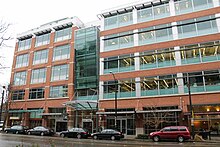This is an old revision of this page, as edited by Qworty (talk | contribs) at 20:40, 8 November 2012 (This isn't , and some of it is WP:COPYVIO. Please discuss sourcing on the article's talk page before making additions.). The present address (URL) is a permanent link to this revision, which may differ significantly from the current revision.
Revision as of 20:40, 8 November 2012 by Qworty (talk | contribs) (This isn't , and some of it is WP:COPYVIO. Please discuss sourcing on the article's talk page before making additions.)(diff) ← Previous revision | Latest revision (diff) | Newer revision → (diff)| This article needs additional citations for verification. Please help improve this article by adding citations to reliable sources. Unsourced material may be challenged and removed. Find sources: "Center for Global Infectious Disease Research" – news · newspapers · books · scholar · JSTOR (February 2012) (Learn how and when to remove this message) |
| Company type | Non-profit organization |
|---|---|
| Industry | Biomedical research, Global health, Infectious disease |
| Founded | 1976 |
| Founder | Ken Stuart |
| Headquarters | Seattle, Washington |
| Key people | Alan Aderem, President |
| Number of employees | 360+ |
| Parent | Seattle Children's Research Institute |
| Website | http://www.seattlebiomed.org/ |
Seattle BioMed, known prior to 2010 as Seattle Biomedical Research Institute or SBRI, is the largest independent, non-profit organization in the United States focused solely on infectious disease discovery research. The mission of Seattle BioMed's 360+ employees is to eliminate the world's most devastating infectious diseases through leadership in scientific discovery. Seattle BioMed is headquartered and has research labs in the South Lake Union area of Seattle, WA and has field labs in Tanzania. Seattle BioMed's research focuses on four areas of infectious disease: HIV/AIDS, malaria, tuberculosos (TB), and Emerging & Neglected Diseases (END) like African trypanosomiasis, leishmaniasis, Chagas disease, and toxoplasmosis. Seattle BioMed is engaged in early stages of the scientific pipeline including bench science and clinical trials and has expertise in immunology, vaccinology, and drug discovery.
History

In 1976, founders Ruth W. Shearer, Ph.D., and Kenneth Stuart, Ph.D., set up a research laboratory in Issaquah, WA. Originally called the Issaquah Group for Health and Environmental Research, the name was soon changed to Issaquah Biomedical Research Institute. Scientists at the Institute studied parasites including ones that cause malaria and African sleeping sickness. In 1986, the Institute relocated to Seattle, Washington to enhance its scientific programs and became Seattle Biomedical Research Institute.
In January 2012, Alan Aderem, Ph.D. became president of Seattle BioMed, only the second in its 36 year history, with Dr. Stuart remaining in an active role as President Emeritus and Founder. As part of the Institute's plan for scientific expansion, Dr. Aderem is leading the implementation of integrating systems biology approaches to understanding infectious disease.
Current Research
Seattle BioMed performs research on four areas of infectious disease:HIV/AIDS, malaria, tuberculosis (TB), and Emerging & Neglected Diseases (END) like African trypanosomiasis, leishmaniasis, Chagas disease, and toxoplasmosis. Seattle is a hug for global health research, and in July 2012, Seattle Magazine honored two Seattle BioMed leaders (Dr. Stuart and Theresa Britschgi, Director of BioQuest) as "Top Docs" for the work they're doing in research and scientific training.
As part of a broad global initiative to fight malaria, Seattle BioMed developed its malaria program in 2000, with an initial grant from the Bill & Melinda Gates Foundation. With a three-pronged approach, Seattle BioMed's malaria program is focused on vaccine discovery for pregnancy malaria, severe malaria in children, and liver-stage malaria. In 2005, Seattle BioMed received two Grand Challenges in Global Health grants to accelerate its malaria research. And in 2011, Seattle BioMed was granted another $9 million from the Foundation to support malaria vaccine efforts.
In 2010, Dr. Stefan Kappe developed his own malaria vaccine candidate which is a weakened form of the malaria parasite, and tht vaccine candidate is undergoing clinical trials at Walter Reed near Washington, D.C. Soon after, in collaboration with PATH's Malaria Vaccine Initiative, Seattle BioMed became home to one of four malaria clinical trial centers in the world where treatments and vaccines can be safely tested in humans using the human challenge model.
BioQuest Academy is a STEM pipeline, and sometimes even "hooks" students into science by accident.
References
- http://humanosphere.kplu.org/2011/06/working-class-kid-builds-a-world-class-research-institute-in-seattle-after-starting-in-a-strip-mall/
- http://www.genomeweb.com/alan-aderem-joins-ken-stuarts-seattle-biomedical-research-institute/
- http://seattlemag.com/gallery/top-doctors-2012-global-health-awards/
- http://www.grandchallenges.org/Pages/GCGHGrantsAwarded.aspx?TDate=Grand%20Challenges%20Grants%20%E2%80%93%20May%202005/
- http://www.xconomy.com/seattle/2011/04/27/seattle-biomed-nabs-9m-gates-foundation-grant-to-develop-malaria-vaccines/
- http://www.nature.com/nature/journal/v484/n7395_supp/full/484S24a.html/
- http://www.xconomy.com/seattle/2010/03/26/nine-years-in-the-making-seattle-biomeds-malaria-vaccine-on-verge-of-first-human-trial/
- http://humanosphere.org/2012/04/hooked-on-science-by-accident-kimberly-choi-puts-it-to-work-in-the-global-community/
External links
47°37′16″N 122°20′20″W / 47.62111°N 122.33889°W / 47.62111; -122.33889
Categories: